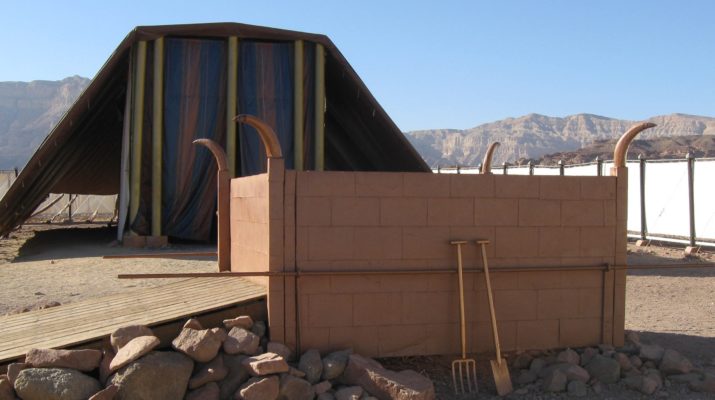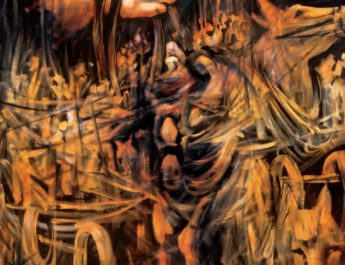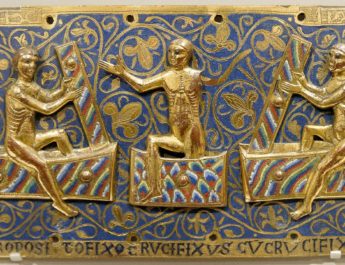Leviticus 3
BibleHub
1 “If the offeringA is a sacrificeB of well-being,C
Notes on verse 1a
A “offering” = zebach. From zabach (to kill, slay, offer; slaughtering an animal to offer as a sacrifice). This is a slaughter – literally of an animal. So, it implies the act or the animals used in sacrifice. Further, it can mean offering.
B “sacrifice” = qorban. From qarab (to come near, offer, make ready). This is an oblation or offering, which is to say, a sacrifice.
C “well-being” = shelem. From shalam (to make amends, finish, be safe, be friendly, to be complete or sound). This is a peace offering or a sacrifice of well-being. It was a voluntary offering given when one celebrated thanksgiving, alliance, or friendship.
if you offerD an animal from the herd,E whether maleF or female,G
Notes on verse 1b
D “offer” = qarab. Related to “sacrifice” in v1. See note B above.
E “herd” = baqar. From baqar (to plow, break forth; figuratively, to inquire, inspect, consider). This is cattle – an animal used for plowing.
F “male” = zakar. From zakar (to remember, to mark something so that it can be recalled, to be mindful of, to mention). This is male. Properly, perhaps, it means one who is remembered, which is to say a male.
G “female” = neqebah. From naqab (to pierce, bore holes, puncture; to make a hole more or less forcefully; also to curse or libel). This is female or woman from an anatomical reference.
you shall offer one without blemishH beforeI the Lord.J
Notes on verse 1c
H “without blemish” = tamim. From tamam (to finish or accomplish; to make perfect, demonstrate that you are upright; consume; to complete in a literal or figurative sense). This is entire in a literal or figurative sense. So, it could be complete, full, intact, or without defect. Alternately, it could refer to being sound, having integrity, being sincere or perfect.
I “before” = paneh. From panah (to turn, face, appear). This is face in a literal or figurative sense. It could be face, presence, anger, respect. It can also be used of God to indicate divine favor or presence.
J “Lord” = YHVH. From havah (to be, become) or hayah (to come to pass, become, be). This is the name of the God of Israel, the self-existent and eternal one, the tetragrammaton. This pronunciation has been lost to time so “Lord” is generally used in its place.
2 You shall layK your handL on the headM of the offeringN and slaughterO it at the entranceP
Notes on verse 2a
K “lay” = samak. This is to lean, rest, support, brace, uphold, sustain, or establish. It is to lean on in a positive or negative sense.
L “hand” = yad. This is hand, ability, power. Hand in a literal sense, but also what one can do or the means by which one does it.
M “head” = rosh. This may come a word that means to shake. It is the head, captain, or chief. It can also be excellent or the forefront. It can be first in position or in statue or in time (i.e. the beginning).
N “offering” = qorban. Same as “sacrifice” in v1. See note B above.
O “slaughter” = shachat. This is to slaughter, slay, or beat. It can be slaying for a sacrifice or in a massacre.
P “entrance” = petach. From patach (to open wide in a literal or figurative sense, loosen, plow, carve). This is opening, door, gate, entrance.
of the tentQ of meeting,R and Aaron’sS sonsT the priestsU
Notes on verse 2b
Q “tent” = ohel. Perhaps from ahal (to shine, be clear). This is a tent, covering, home, or side pillar.
R “meeting” = moed. From yaad (to appoint, assemble or gather selves, agree). This is a meeting, assembly, fixed time. It can be used for a festival or feast. It can also refer to a meeting place.
S “Aaron’s” = Aharon. Derivation uncertain. May mean “bearer of martyrs” OR be related to Ancient Egyptian ꜥḥꜣ rw (warrior lion) OR elevated, exalted, high mountain. This is Aaron. See https://en.wiktionary.org/wiki/Aaron
T “sons” = ben. From banah (to build or obtain children). This is son, age, child. It is son in a literal or figurative sense.
U “priests” = kohen. This is literally the one who officiates i.e. the priest. This is where the Jewish last name “Cohen” (and its variants) comes from.
shall dashV the bloodW against all sidesX of the altar.Y
Notes on verse 2c
V “dash” = zaraq. This is to scatter or sprinkle, whether a liquid or a solid.
W “blood” = dam. Perhaps from damam (to cease, be or become mute, silent, still, cut off, hold peace, be astonished, die). This is blood, bloodshed, bloodguilt, lifeblood, and death. It is used for people and animals. More often blood from a wound or the blood of the innocent. Used figuratively for violence or for wine. Closely tied to life and death.
X “all sides” = sabib. From sabab (turning around, going around; to surround, cast, walk, fetch; to revolve or border in a literal or figurative sense). This is a circuit or a circle. It could refer to an environment, one’s neighbors, or a circular path round about.
Y “altar” = mizbeach. Related to “offering” in v1. From zabach (see note A above). This is an altar.
3 You shall offer from the sacrificeZ of well-being, as an offering by fireAA to the Lord, the fatBB
Notes on verse 3a
Z “sacrifice” = zebach. Same as “offering” in v1. See note A above.
AA “offering by fire” = ishsheh. From eshshah (a fire); from esh (fire, burning, flaming, hot; fire in a literal or figurative sense). This is an offering by fire or a burnt offering. More broadly, it can refer to any kind of sacrifice.
BB “fat” = cheleb. This is fat, finest, marrow. It is fat in a literal or figurative sense. It refers to the richest or best part.
that coversCC the entrailsDD and allEE the fat that is around the entrails,
Notes on verse 3b
CC “covers” = kasah. This is to cover, conceal, overwhelm. It is to cover as clothes do or to hide a secret.
DD “entrails” = qereb. Related to “sacrifice” and “offer” in v1. Perhaps from qarab (see note B above). This is among, in the midst, before, the center It is the inward part, whether literal or figurative. It can also be used for the heart, the site of thoughts and feelings. This word is also used as a technical term for the entrails of the animals who are sacrificed.
EE “all” = kol. From kalal (to complete). This is all or every.
4 the twoFF kidneysGG with the fat that is on them at the loins,HH and the appendageII of the liver,JJ which he shall removeKK with the kidneys.
Notes on verse 4
FF “two” = shenayim. From sheni (double, again, another, second); from shanah (to fold, repeat, double, alter, or disguise). This is two, both, second, couple.
GG “kidneys” = kilyah. Perhaps from keli (something that was prepared – any implement, utensil, article, vessel, weapon, or instrument; also includes jewels, weapons, bags, carriages, and furniture); from kalah (to end, be finished, complete, prepare, consume, spent, or completely destroyed). This is inward parts, such as kidney or heart. It can also be inmost being as feelings, mind, or within.
HH “loins” = kesel. 13x in OT. From kasal (being or becoming stupid or foolish; properly, being fat and so figuratively silly or foolish). This is loins, thigh, flank, fatness. It can also be folly, silliness, confidence, or hope.
II “appendage” = yothereth. 11x in OT. From yathar (to jut over, remain behind, preserve, to excel). This is appendage or part of the liver that hangs out.
JJ “liver” = kabed. 14x in OT. From kabad (to be heavy, weighty, burdensome). This is usually liver – sometimes heart.
KK “remove” = sur. This is to turn aside in a literal or figurative sense – to depart, decline, rebel, remove, or withdraw.
5 Then Aaron’s sons shall turn these into smokeLL on the altar, with the burnt offeringMM that is on the woodNN
Notes on verse 5a
LL “turn…into smoke” = qatar. Perhaps from qetoreth (smoke, incense, the scent of the sacrifice as it burned); from the same as qitor (thick smoke, vapor). This is to make an offering, particular one of burned incense. It focuses on the fragrance made from the sacrificial fire. This is generally used to refer to worship.
MM “burnt offering” = olah. From alah (to go up, climb, approach, bring; to be high or actively climb; can be literal or figurative). This is a step, stairs, or some kind of ascent. It is also used for whole burnt offerings, being the offering in which the whole things is burned and rises as smoke. Burnt offerings were the least common of the offerings: most were eaten, shared with the priest and the one bringing the offering.
NN “wood” = ets. Perhaps from atsah (to shut, fasten, firm up, to close one’s eyes). This is tree or other things related to trees like wood, sticks, or stalks. It can also refer to wood products like a plank or staff or gallows. Additionally, this can refer to a carpenter.
on the fire,OO as an offering by fire of pleasingPP odorQQ to the Lord.
Notes on verse 5b
OO “fire” = esh. Related to “offering by fire” in v3. See note AA above.
PP “pleasing” = nichoach. From nuach (to rest, calm, camp, free, place, remain, satisfy, settle, station, or wait; implies settling down in a literal or figurative sense). This is soothing, restful, sweet, pleasant.
QQ “odor” = reyach. From ruach (to blow, breath; smell, anticipate; figuratively, to perceive, understand). This is a scent or breath – a savor, ointment. It is also used for the odor of sacrifices that pleases God.
6 “If your offeringRR for a sacrificeSS of well-being to the LordTT is from the flock,UU male or female, you shall offer one without blemish. 7 If you presentVV a sheepWW as your offering, you shall bring it before the LordXX
Notes on verses 6-7
RR “offering” = qorban. Same as “sacrifice” in v1. See note B above.
SS “sacrifice” = zebach. Same as “offering” in v1. See note A above.
TT “Lord” = YHVH. Related to “Lord” in v1. See note J above. It has a different vowel pointing, but the same meaning.
UU “flock” = tson. This is a flock of sheep and goats.
VV “present” = qarab. Same as “offer” in v1. See note D above.
WW “sheep” = keseb. 13x in OT. From kebes (root may mean to dominate; a young male sheep at the age of butting other sheep). This is apparently the same word as kebes, but with the consonants mixed up. It is a young lamb or sheep.
XX “Lord” = YHVH. Same as “Lord” in v1. See note J above.
8 and lay your hand on the head of the offering.YY It shall be slaughtered before the tent of meeting, and Aaron’s sons shall dash its blood against all sides of the altar. 9 You shall present its fat from the sacrificeZZ of well-being, as an offering by fire to the Lord:AAA the wholeBBB fatty tail,CCC which shall be removed close toDDD
Notes on verses 8-9a
YY “offering” = qorban. Same as “sacrifice” in v1. See note B above.
ZZ “sacrifice” = zebach. Same as “offering” in v1. See note A above.
AAA “Lord” = YHVH. Same as “Lord” in v1. See note J above.
BBB “whole” = tamim. Same as “without blemish” in v1. See note H above.
CCC “fatty tail” = alyah. 5x in OT– 1x in Exodus & 4x in Leviticus. From alah (wail, lament); related to alah (swear, curse). This is a fatty tail or rump on a sheep.
DDD “close to” = ummah. From im (with, against, before, beside); from amam (to darken, hide, associate; creating shadows by huddling together). This is close by, alike, parallel, corresponding.
the backbone,EEE the fat that covers the entrails and all the fat that is around the entrails, 10 the two kidneys with the fat that is on them at the loins, and the appendage of the liver, which you shall remove with the kidneys. 11 Then the priest shall turn these into smoke on the altar as a foodFFF offering by fire to the Lord.GGG
12 “If your offeringHHH is a goat,III you shall bring it before the LordJJJ
Notes on verses 9b-12
EEE “backbone” = atseh. Related to “wood” in v5. 1x in OT. Perhaps from atsah (see note NN above). This is spine or backbone.
FFF “food” = lechem. From lacham (to eat, feed on). This is bread, food, loaf. It can refer to food more generally for people or for animals.
GGG “Lord” = YHVH. Same as “Lord” in v1. See note J above.
HHH “offering” = qorban. Same as “sacrifice” in v1. See note B above.
III “goat” = ez. Perhaps from azaz (to be strong in a literal or figurative sense, overcome, be impudent). This is a female goat, but can refer to male goats when plural.
JJJ “Lord” = YHVH. Same as “Lord” in v1. See note J above.
13 and lay your hand on its head; it shall be slaughtered before the tent of meeting, and the sons of Aaron shall dash its blood against all sides of the altar. 14 You shall present as your offeringKKK from it, as an offering by fire to the Lord,LLL the fat that covers the entrails and all the fat that is around the entrails, 15 the two kidneys with the fat that is on them at the loins, and the appendage of the liver, which you shall remove with the kidneys. 16 Then the priest shall turn these into smoke on the altar as a food offering by fire for a pleasing odor.
“All fat is the Lord’s.MMM 17 It shall be a perpetualNNN statuteOOO
Notes on verses 13-17a
KKK “offering” = qorban. Same as “sacrifice” in v1. See note B above.
LLL “Lord” = YHVH. Same as “Lord” in v1. See note J above.
MMM “Lord’s” = YHVH. Same as “Lord” in v1. See note J above.
NNN “perpetual” = olam. This is a long scope of time whether in the past (antiquity, ancient time) or in the future (eternal, everlasting).
OOO “statute” = chuqqah. From choq (statute, boundary, condition, custom, limit, ordinance; something that is prescribed or something that is owed); from chaqaq (to inscribe, carve, or decree; a lawmaker; literally, this is engraving, but it implies enacting a law because laws were carved into stone or metal). This is something prescribed such as a statue, custom, or ordinance.
throughout your generations,PPP in all your settlements:QQQ you must not eatRRR anySSS fat or any blood.”
Notes on verse 17b
PPP “generations” = dor. From dur (to move in a circle, which implies living somewhere or remaining there; it can also be the sense of piling or heaping up). This is a revolution of time, which is to say, an age or generation. It can also be a dwelling or one’s posterity.
QQQ “settlements” = moshab. From yashab (to sit and so to remain and so to dwell; sitting for any reason – as a judge, in order to ambush, or just sitting quietly; can mean settling or marrying; continue, endure, or establish). This is dwelling, seat, assembly, settlement, population.
RRR “eat” = akal. This is to eat, devour, burn up, or otherwise consume. It can be eating in a literal or figurative sense.
SSS “any” = kol. Same as “all” in v3. See note EE above.
Image credit: “Timna Tabernacle Altar of Burnt Offerings.” Photo by Ori229, 2009.




